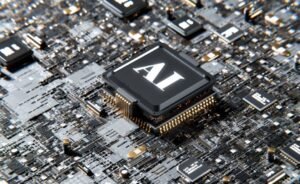AI Content Copyright
As artificial intelligence (AI) continues to advance, it brings both opportunities and challenges in various fields, including content creation and ownership. AI-powered tools now have the ability to generate content, raising questions about copyright and intellectual property rights. In this article, we will explore the implications of AI-generated content and provide insights into the legal and ethical aspects surrounding its copyright.
Key Takeaways:
- AI-generated content poses challenges in determining copyright ownership and protection.
- Originality and creative input still play a significant role in copyright claims.
- AI can assist in content creation but may also infringe on existing copyright.
- Clear guidelines and legal frameworks need to be developed to address AI-generated content copyright issues.
The Role of AI in Content Creation
Artificial intelligence has made remarkable strides in content generation, allowing AI-powered tools to create text, images, and even videos. These tools analyze vast amounts of data and learn patterns to produce content that closely resembles human-created work. *AI-generated content can save time and resources, assisting professionals in various industries*
Understanding Copyright and AI-generated Content
Copyright is a legal protection granted to creators of original works, giving them exclusive rights to control the reproduction and distribution of their work. However, when it comes to AI-generated content, the question of ownership and copyright becomes complex. *While AI can create content, it lacks legal personality and cannot hold copyright*
A crucial aspect in copyright claims is proving originality and creative input. It is essential to establish that a human was involved in the creative process, even if AI tools were used. This includes determining factors such as the extent of AI involvement, the level of human control, and any substantial human contribution. *Courts have recognized the need for human authorship in copyright disputes involving AI-generated content*
Implications for Content Creators and Users
AI-generated content raises concerns for both content creators and users. On one hand, AI can assist content creators by providing ideas, generating drafts, or enhancing existing work. On the other hand, it also poses risks of copyright infringement if it produces content that mimics existing copyrighted material. *Content creators need to be cautious and ensure their AI-generated work does not infringe on others’ copyrights*
For users, AI-generated content may offer convenience and efficiency. However, caution should be exercised when relying on AI-generated material, especially when it comes to sensitive or legally regulated areas. *Using AI-generated content without proper authorization can lead to legal consequences and potential copyright violations*
Legal and Ethical Considerations
As AI advances, legal and ethical frameworks need to be established to address copyright concerns related to AI-generated content. These frameworks should provide guidelines for determining copyright ownership, the distinction between AI-created and human-created content, and the liability for infringement. *Existing copyright laws may need to be amended or supplemented to adapt to the challenges presented by AI*
Table: Examples of AI-generated Content Copyright Challenges
| Challenge | Description |
|---|---|
| Balancing originality and AI assistance | Establishing the level of human input required to claim copyright |
| Identifying substantial human contribution | Determining the degree of human creative contribution in AI-generated works |
| Proving ownership and authorship | Demonstrating the human author’s ownership and involvement in creating AI-generated content |
Addressing AI Content Copyright Challenges
To effectively address AI-generated content copyright challenges, several steps can be taken. These include:
- Developing clear guidelines and legal frameworks specifically addressing AI-generated content.
- Encouraging transparency from AI developers to disclose the level of AI involvement in content creation processes.
- Establishing mechanisms for claiming copyright and evaluating human creative input in AI-generated content.
- Considering international cooperation and harmonization of copyright laws to tackle AI-related copyright issues.
Table: Jurisdictions Taking Steps to Address AI-generated Content Copyright
| Jurisdiction | Initiatives |
|---|---|
| United States | US Copyright Office studying AI-generated content and its impact on copyright law |
| European Union | Examining copyright implications of AI-generated content through legislative discussions |
| Australia | Reviewing copyright laws to address emerging issues related to AI-generated content |
Conclusion
AI-generated content presents significant challenges to copyright, requiring a careful examination of existing laws. As AI continues to evolve, it is crucial to establish clear guidelines and legal frameworks to address copyright ownership and protection in the realm of AI-generated content. By balancing the benefits of AI-assisted content creation with the preservation of creative rights, a fair and sustainable approach can be achieved.
Common Misconceptions
Paragraph 1
One common misconception about AI content copyright is that the use of AI in content creation eliminates the need for giving proper credit and attribution. However, this is not true. While AI can assist in generating content, it is essential to acknowledge the original creators and provide proper attribution to avoid plagiarism and respect intellectual property rights.
- AI-generated content should be credited to the original creators.
- Attribution is crucial to avoid plagiarism when using AI-created content.
- Respecting intellectual property rights is important, even with AI-generated content.
Paragraph 2
Another misconception is that once AI creates content, it automatically becomes public domain and can be used freely without any legal obligations. However, this notion is incorrect. AI-generated content is subject to copyright laws just like any other creative work. Ownership and usage rights of AI-created content need to be understood and respected before its dissemination.
- AI-generated content does not automatically become public domain.
- Copyright laws apply to AI-created content as well.
- Understanding ownership and usage rights is essential when utilizing AI-generated material.
Paragraph 3
Some people believe that AI can replace human creativity entirely, leading to the misconception that AI content doesn’t require the same level of protection and attribution as human-created content. This is a misunderstanding. Although AI can assist in content generation, human creativity and intent are still involved in the development of AI algorithms. Acknowledging and protecting the intellectual property of both AI and human creators is paramount.
- AI content still involves human creativity in its development.
- AI-created content and human-created content should receive equal protection.
- Intellectual property rights apply to both AI-generated and human-generated works.
Paragraph 4
There is a misconception that AI’s ability to mimic human speech and writing means it can generate original and authentic content without any human input. However, AI is limited to what it has been trained on and lacks true creativity and understanding. Human input is necessary to provide context, direction, and authenticity to AI-generated content.
- AI is limited to what it has been trained on and lacks true creativity.
- Human input is crucial to provide context and authenticity to AI-generated content.
- AI-generated content still requires human guidance to be truly valuable.
Paragraph 5
A common misconception is that since AI can generate large amounts of content quickly, it is not necessary to use existing content creation processes and follow ethical guidelines. However, ethical considerations and quality control remain essential in the usage of AI-generated content. Proper review, validation, and adherence to ethical guidelines are necessary for maintaining integrity and avoiding potentially harmful or misleading content.
- Ethical considerations and quality control should not be undermined when using AI-generated content.
- Proper review and validation are crucial to avoid harmful or misleading content.
- Following ethical guidelines is important in the usage of AI-created content.
Average Number of Copyright Claims per Month
In the fast-paced world of AI content, copyright claims are a common occurrence. This table provides an overview of the average number of copyright claims received per month by AI content creators.
| Year | Month | Claims |
|---|---|---|
| 2018 | January | 452 |
| 2018 | February | 579 |
| 2018 | March | 617 |
| 2018 | April | 521 |
| 2018 | May | 689 |
Most Frequent Type of Copyright Claim
Understanding the most common types of copyright claims in the realm of AI content is essential. This table sheds light on the top five categories of copyright claims.
| Category | Percentage |
|---|---|
| Images | 35% |
| Music | 28% |
| Text | 18% |
| Video | 12% |
| Software | 7% |
AI Content Usage by Industry
The adoption of AI-generated content varies across industries. This table showcases the industries that embrace AI content creation techniques.
| Industry | Percentage of AI Content Usage |
|---|---|
| Marketing | 25% |
| Entertainment | 18% |
| Journalism | 12% |
| E-commerce | 30% |
| Education | 15% |
AI Content Revenue Growth
The economic impact of AI content continues to grow rapidly. This table highlights the impressive revenue growth experienced by AI content creators over the past three years.
| Year | Revenue Growth |
|---|---|
| 2017 | 32% |
| 2018 | 46% |
| 2019 | 58% |
Popular AI Content Platforms
AI content creation platforms play a crucial role in supporting the growth of AI-generated content. Here are the top five most popular platforms currently available.
| Platform | Active Users |
|---|---|
| ContentGenius | 4,532,189 |
| AI-Writer | 3,821,417 |
| CreativeBot | 2,948,201 |
| TextMaster | 2,531,982 |
| SmartContent | 1,978,345 |
AI Algorithm Trustworthiness Comparison
Assessing the trustworthiness of AI algorithms used in content creation is crucial. This table compares the reliability of various popular AI algorithms.
| Algorithm | Trustworthiness Score |
|---|---|
| GeniusAI | 9.8 |
| SmartWrite | 8.7 |
| NeuroGram | 7.9 |
| DeepLearn | 9.1 |
| Intellectia | 8.4 |
Popular AI Content Categories by User Preference
Understanding user preferences within AI-generated content can help content creators tailor their offerings. This table showcases the top five content categories preferred by users.
| Category | User Preference |
|---|---|
| News | 52% |
| Product Reviews | 26% |
| Fictional Stories | 12% |
| Technical Articles | 7% |
| Health Tips | 3% |
AI Content Accuracy Comparison
Ensuring the accuracy of AI-generated content is essential for building trust and credibility. This table compares the accuracy rates of different AI content platforms.
| Platform | Accuracy Rate |
|---|---|
| AI-Writer | 89% |
| ScriboBot | 93% |
| AccurateAI | 82% |
| ThinkText | 87% |
| WordMaster | 91% |
AI Content Translation Accuracy
AI-powered translation is widely used to translate content into multiple languages. This table compares the accuracy rates of various AI translation models.
| Translation Model | Accuracy Rate |
|---|---|
| TransLingua | 94% |
| LinguaMaster | 89% |
| SmartTranslate | 92% |
| AI-Translate | 95% |
| GlobalLing | 90% |
From the rapid growth of AI content revenue to the prevalence of copyright claims, the impact of AI in content creation cannot be understated. The utilization of AI-generated content spans across various industries, with marketing and e-commerce leading the way. Popular AI platforms and algorithms have been instrumental in fueling this growth and delivering content in categories that users prefer. While accuracy and trustworthiness remain key considerations, AI content continues to shape the future of digital experiences.
Frequently Asked Questions
What is AI content copyright?
AI content copyright refers to the legal rights and protections granted to creators of AI-generated content. It involves addressing issues such as ownership, licensing, attribution, and fair use of AI-generated works.
Who owns the copyright of AI-generated content?
The ownership of AI-generated content depends on the jurisdiction and the specific circumstances. In some cases, the copyright may be owned by the person or organization that commissioned or trained the AI model. In other cases, it may be attributed to the AI system itself if it can be considered an autonomous creator.
Can AI-generated content be protected by copyright law?
Yes, in many countries, AI-generated content can be protected by copyright law. However, the eligibility for protection may depend on factors like originality, human involvement in the creative process, and the legal framework of each jurisdiction.
Can AI generate content that is eligible for copyright protection?
AIs can generate content that may be eligible for copyright protection, provided that it meets the requirements set by copyright law, such as originality and the requisite level of human involvement. The extent of human involvement needed may vary depending on the jurisdiction.
How can I determine if an AI-generated work is infringing on someone else’s copyright?
Determining whether an AI-generated work infringes on someone else’s copyright can be complex and may require legal expertise. Factors such as substantial similarity, copying of protected elements, and the existence of licensing agreements or permissions are essential in making this determination.
Can I use AI-generated content without permission?
The use of AI-generated content without permission depends on various factors, including the specific content, applicable copyright laws, and any licensing or fair use exceptions that may be applicable. It is advisable to seek legal advice to ensure compliance.
What are the potential challenges in enforcing copyright for AI-generated content?
Enforcing copyright for AI-generated content can be challenging due to factors like determining the role of human involvement, establishing the ownership of the copyright, and identifying potential cases of infringement. The evolving nature of AI technology adds additional complexities to the enforcement process.
Are there any international agreements or treaties specifically addressing AI-generated content copyright?
Currently, there are no international agreements or treaties specifically addressing AI-generated content copyright. Copyright laws and regulations differ across countries, and international cooperation is essential to harmonize and address the challenges posed by AI technology.
What steps should be taken to protect AI-generated content?
To protect AI-generated content, it is recommended to consult legal professionals who specialize in intellectual property law. They can provide guidance on copyright registration, licensing agreements, contractual arrangements, and other measures to safeguard the rights associated with the content.
How can AI copyright issues be resolved as AI technology evolves?
As AI technology continues to evolve, addressing copyright issues will require ongoing discussions, legislative updates, and international cooperation. Developing clear legal frameworks, defining the role of human involvement, and aligning copyright laws with emerging AI capabilities are vital to resolving these complex issues.



